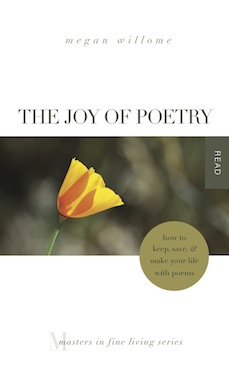When people ask why I wrote The Joy of Poetry, they’re usually shocked when I answer, “I was asked to.” The publisher, L.L. Barkat of T. S. Poetry Press, contacted me on January 1, 2014, and asked if I’d like to write a book. She already had the title picked out. I signed the contract that day.
How did such an amazing opportunity happen? The short answer is that it was a blessing, pure and simple (Ronald Wallace: “Blessings / occur.“) But since I love to hear how other writers work, I’m hoping you will, too, as I share the details of my publishing journey. This post (and the three that will follow) are not really a guide for “How to Do It, ” though. It’s more like “How I Did It This Time.” If I were to get another book contract tomorrow, my process might be different.
As with most good publishing stories, writing The Joy of Poetry started long before that New Year’s Day communication with my publisher—all the way back to the many writerly things I was already doing as part of my writing life. I participated in online writing communities, especially Tweetspeak Poetry. I occasionally submitted poems to contests or journals. I’ve been in a writing group for a decade, and I sometimes visit others. Scribbling quietly has its place, and believe me, most of what I scribble will stay quiet. But there’s also a place for getting your words and yourself out there.
Also, I should mention, especially after reading a recent post from Ann Kroeker about writer moms, that I do not have young children competing for my attention while I write. One chick has already flown the coop, and the other attends a boarding school, so I am living in a pseudo empty nest. Which gives me both time and opportunity to do a project like this.
That’s the only part of this story that was easy breezy, though. The rest? Let’s just say it didn’t go as planned.
After my mom died, many people approached me about writing a book chronicling her decades-long struggle with cancer. I declined, knowing the publishing industry was not clamoring for the tale of another woman (without a platform) who bravely faced cancer. Although my mom was proud of my poems – even way back in second grade when it was all by assignment – poetry wasn’t her jam. The idea that I might use poems to tell her story would have made no sense to her. It didn’t make sense to me at first either.
I’m also grateful this book was essentially an “assignment” from my publisher, since I write by assignment for a living in my work as the managing editor of The Wacoan. Otherwise, this book simply would not have been written. Why? Because I had no idea I was so passionate about the joy of poetry until someone asked me to write about it. And other than the poems I’d already posted online, I had no plans to write about my mom, whose experience with cancer features prominently in the book, until I was given the opportunity to rewrite the book. But I’m getting ahead of myself.
For now, just know that if the book had all been my idea, I think I would have given up.
Photo by Sean McGrath, Creative Commons, via Flickr. Post by Megan Willome, author of The Joy of Poetry.
Browse more finding inspiration
__________
“Megan Willome’s The Joy of Poetry is not a long book, but it took me longer to read than I expected, because I kept stopping to savor poems and passages, to make note of books mentioned, and to compare Willome’s journey into poetry to my own. The book is many things. An unpretentious, funny, and poignant memoir. A defense of poetry, a response to literature that has touched her life, and a manual on how to write poetry. It’s also the story of a daughter who loses her mother to cancer. The author links these things into a narrative much like that of a novel. I loved this book. As soon as I finished, I began reading it again.”
—David Lee Garrison, author of Playing Bach in the D. C. Metro
- Perspective: The Two, The Only: Calvin and Hobbes - December 16, 2022
- Children’s Book Club: A Very Haunted Christmas - December 9, 2022
- By Heart: ‘The night is darkening round me’ by Emily Brontë - December 2, 2022


Donna Falcone says
Megan, I can’t wait to read the next three installments. 🙂
And, I am so glad you were asked – this is a very special and enormous little book.
Megan Willome says
Thank you, Donna! I love the thought of the book being both “enormous” and “little.”
Maureen says
The mix of your mother’s story and your experiences of poetry are what make this so lovely a book. It has staying power.
Megan Willome says
So glad to hear that, Maureen!
L.L. Barkat says
Sometimes there is nothing to do but ask. When the heart & soul and even, dare I say it, the future of a writer is palpable in some concrete aspect of that writer’s life (for you, it was your fairly unique relationship to poetry—the way you had been reading it every day for so long, the way you kept it (and yourself through it) with tangible things like the notebooks), then the asking just comes.
As you know, I love the book. I love the heart & soul that vibrates in its pages. The tenderness, the struggles, the frankness, the wit. I love it all. 🙂
Megan Willome says
The wit still surprises me. I did a reading yesterday, and people laughed. Wow!
Bethany R. says
Each chapter of your book was fascinating. I’m looking forward to this series of posts.
“I’m also grateful this book was essentially an ‘assignment’ from my publisher, since I write by assignment for a living… Otherwise, this book simply would not have been written.” It’s lovely how someone you trusted pointed to the potential art in you and called it out. And now I have your book on my writing desk.
Megan Willome says
What an honor, Bethany! And yes, L.L. saw potential art that I did not see and would never have thought to look for.
Sandra Heska King says
“After my mom died, many people approached me about writing a book chronicling her decades-long struggle with cancer. I declined, knowing the publishing industry was not clamoring for the tale of another woman (without a platform) who bravely faced cancer.”
These words really stood out to me, especially since my sister and I have talked about how we might tell the story of walking through our mom’s last days.
I love how L.L. recognizes gifts and potentials in others and that her request to you even came with a title.
Megan Willome says
I think there may be a way, Sandy, just not necessarily the traditional way.
Matthew Kreider says
Megan, your book was exactly the invitation I needed. My own notebook has now become a thrilling space. Every day has grown richer and slower, more deliberate and more playful.
I love your book. I keep it close to my heart.
Megan Willome says
Matthew, what a lovely way to start my day–by reading your comment! Thank you.
Dixie says
Megan I’m loving your book. It’s on my nightstand as sort of my nightly devotional. I read slowly to take in all those times I felt a part of the family still & feeling emotional. I love your style & impressed with your way with words. Thank you. Love you.
Megan Willome says
Oh, Aunt Dixie! I love you too! This means so much to me. Thank you!
Linda Chontos says
I’m looking forwarding to following your publishing “journey,” Megan. I was just browsing through your beautiful book again today. I’m inspired in so many ways – perhaps to look for a poetry buddy; or keep a notebook and journal; mostly to read more poetry.
Megan Willome says
So glad you’re reading here and in the book, Linda. Keeping a poetry notebook and journal is so easy, and the more you read poetry, the more you’ll want to keep it close by, for when you need it